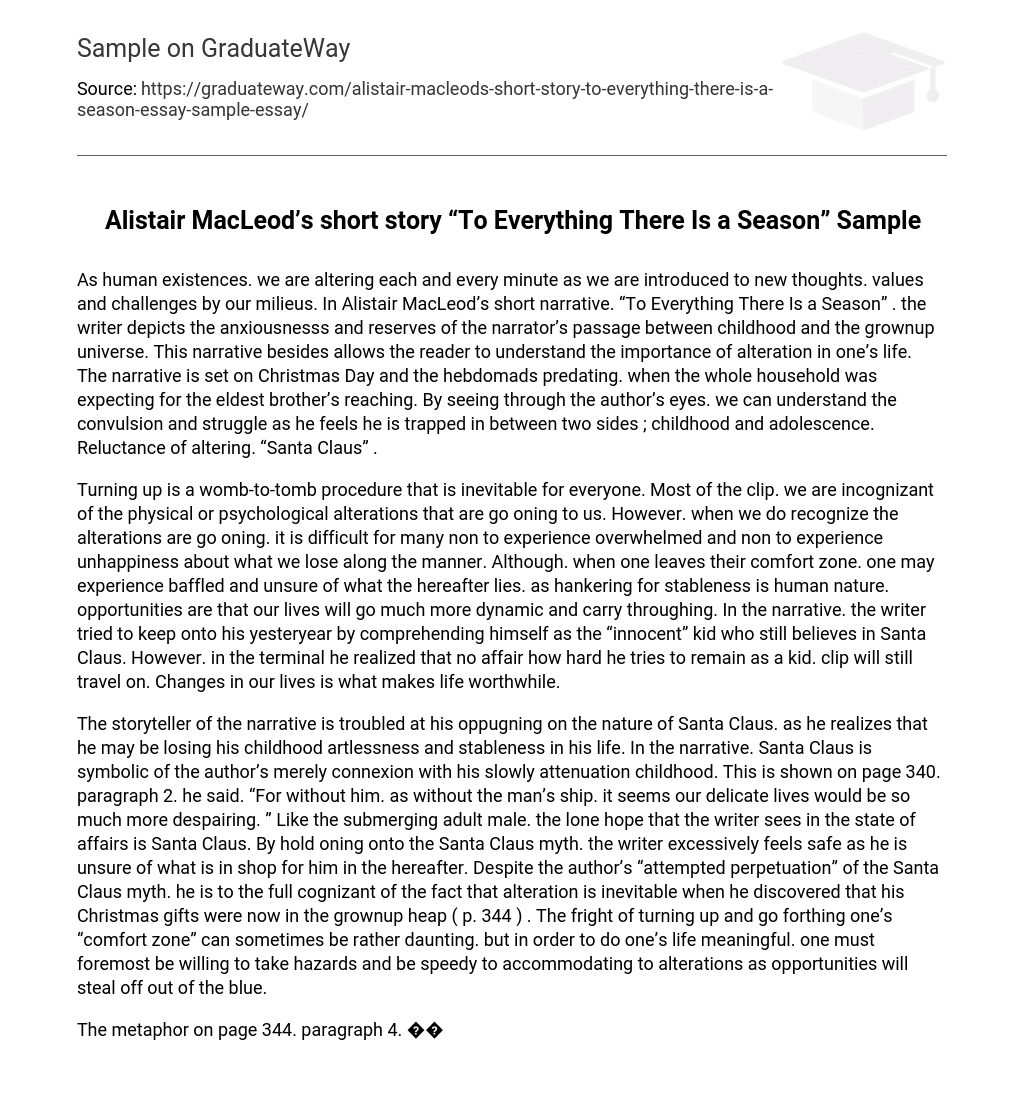As human existences. we are altering each and every minute as we are introduced to new thoughts. values and challenges by our milieus. In Alistair MacLeod’s short narrative. “To Everything There Is a Season” . the writer depicts the anxiousnesss and reserves of the narrator’s passage between childhood and the grownup universe. This narrative besides allows the reader to understand the importance of alteration in one’s life. The narrative is set on Christmas Day and the hebdomads predating. when the whole household was expecting for the eldest brother’s reaching. By seeing through the author’s eyes. we can understand the convulsion and struggle as he feels he is trapped in between two sides ; childhood and adolescence. Reluctance of altering. “Santa Claus” .
Turning up is a womb-to-tomb procedure that is inevitable for everyone. Most of the clip. we are incognizant of the physical or psychological alterations that are go oning to us. However. when we do recognize the alterations are go oning. it is difficult for many non to experience overwhelmed and non to experience unhappiness about what we lose along the manner. Although. when one leaves their comfort zone. one may experience baffled and unsure of what the hereafter lies. as hankering for stableness is human nature. opportunities are that our lives will go much more dynamic and carry throughing. In the narrative. the writer tried to keep onto his yesteryear by comprehending himself as the “innocent” kid who still believes in Santa Claus. However. in the terminal he realized that no affair how hard he tries to remain as a kid. clip will still travel on. Changes in our lives is what makes life worthwhile.
The storyteller of the narrative is troubled at his oppugning on the nature of Santa Claus. as he realizes that he may be losing his childhood artlessness and stableness in his life. In the narrative. Santa Claus is symbolic of the author’s merely connexion with his slowly attenuation childhood. This is shown on page 340. paragraph 2. he said. “For without him. as without the man’s ship. it seems our delicate lives would be so much more despairing. ” Like the submerging adult male. the lone hope that the writer sees in the state of affairs is Santa Claus. By hold oning onto the Santa Claus myth. the writer excessively feels safe as he is unsure of what is in shop for him in the hereafter. Despite the author’s “attempted perpetuation” of the Santa Claus myth. he is to the full cognizant of the fact that alteration is inevitable when he discovered that his Christmas gifts were now in the grownup heap ( p. 344 ) . The fright of turning up and go forthing one’s “comfort zone” can sometimes be rather daunting. but in order to do one’s life meaningful. one must foremost be willing to take hazards and be speedy to accommodating to alterations as opportunities will steal off out of the blue.
The metaphor on page 344. paragraph 4. “It is as if I have all of a sudden moved into another room and heard a door chink lastingly behind me. I am jabbed by my ain little lesion. ” describes the author’s feeling of unhappiness and fright from the passage from his childhood into the grownup universe. The scene before this metaphor describes the author’s realisation of his forever going from his childhood universe as his nowadayss are no longer from “Santa Claus” . unlike his younger brothers. Christmas is a vacation filled with joy and laughter. nevertheless for the writer. this Christmas meant the grade of his entryway in the grownup universe. As he said on page 344. paragraph 4. “…so much surprised as touched by a stab of loss at being here at the big side of the universe. ” He is unsure of the hereafter and afraid of losing his childhood artlessness and memories. However. at the terminal of the narrative his male parent reminds him that. “…there is no demand to sorrow. He leaves good things behind. ” It is true that we may lose some of our memories along the manner as we grow up. but it is besides true that the hereafter awaits us with new challenges and wagess.
The universe around us is everlastingly altering – new engineerings develop. wars erupt. babes born and people deceasing – and we are cognizant of them. Normally. these sorts of alterations do non bring forth uncomfortableness or edginess in us. However. when a alteration is go oning within or that is closely related to us and the result is unknown. we will endeavor to keep onto something for stableness – past memories. old values. taking up a avocation. practising faiths. and more. It is because worlds have the inclination to overstate the fright of the hereafter or the unknown. The narrator’s hurt of turning up is a valid illustration of this peculiar section of human nature. Still. as human existences. we have the ability to rationally analyse a state of affairs. As philosopher Heraclites wrote more than 2500 old ages ago. “Everything flows and changes” . and “You can non step in the same river twice. ” Therefore. why should one be everlastingly sorrowing for the losingss which come with all alterations. when we can encompass the hereafter with the same sum of enthusiasm and expectancy?





